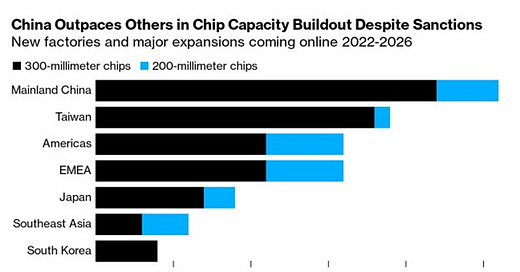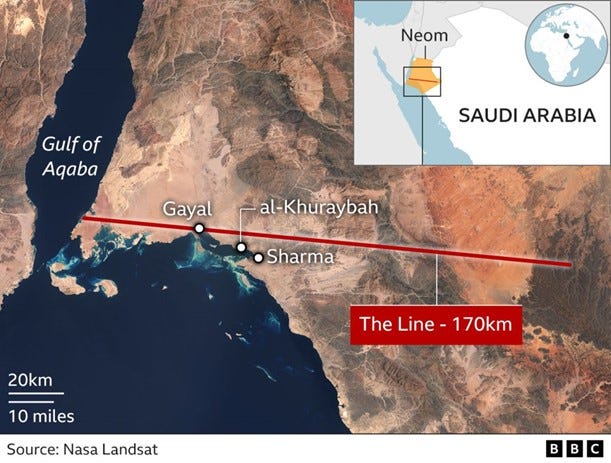[The number of subscribers continues to grow. Thank you to the endorsements by a committee of the Geographical Association in England (of which I am not a member) and other individuals.
Some other points: Substack inform me that most subscribers do not use the Substack app on their phones, tablets etc – can I recommend that you do as the quality of presentation is better than from direct email? And there you can also enjoy the excellent Substacks of writers such as: Ann Pettifor (System Change), Noah Smith (Noahpinion), Ed Conway (Material World), Judith Hubbard and Kyle Bradley (Earthquake Insights) and Hannah Ritchie (Sustainability by numbers) in full glory…. and many others.
Here are three short topics related to Human Geography (linked to Global systems, Urban development, and Population migration) that have caught my eye in the news in recent weeks. More such updates will follow on a sporadic basis.]
1. Global systems
In the USA, the Chips and Science Act, which has been backed by more than $100 billion in government grants, loans, and guarantees for semiconductor firms to build factories in America, has unleashed a further significant amount of investment in US-based electronic chip production. This all follows significant investment in renewables due to the Inflation Reduction Act.
China is also building up to 30 new facilities for parts of this important supply chain. China still controls this key manufacturing sector (see graph below).
Whilst China is the largest global supplier of such chips, it is also an important revenue source for US, Japanese and especially European companies that supply the motor vehicle industry there. China is the world’s biggest market for electric vehicles, which need growing numbers of chips for sensors, power management and braking systems - and it relies on foreign chipmakers like Infineon of Germany and Texas Instruments (US) to meet that demand.
[EMEA = Europe, Middle East and Africa]
2. Urban development in Saudi Arabia
The Saudi Arabian government has announced the building of a futuristic urban desert project funded by many western companies. The project is known as The Line. The Line is a proposed 170km long and 200m wide skyscraper project costing over $500 billion in a region in north-west Saudi Arabia called Neom.
The development is part of ‘Saudi vision 2030’ – a plan for diversifying the Saudi economy to move away from dependency on oil exports. Saudi authorities state that the project is ‘a blank canvas for an experimental city’, but more than 6,000 people have already been displaced to make way for the project.
In the UK, a former Saudi soldier has claimed that he was ordered to use lethal force on those resisting eviction in the village of al-Khuraybah, 4.5km south of The Line. One man was shot and killed after refusing to allow authorities to value his property. The UN has reported that up to 47 villagers have been arrested for resisting eviction, with 40 still in custody, some facing the death penalty.
See also:
Neom: Saudi forces 'told to kill' to clear land for eco-city - BBC News
3. European migration to the UK post Brexit
Since 1 January 2021, EU nationals arriving in the UK must follow one of the specified visa routes for residence in the UK. Due to post-Brexit immigration policy, only 5% of all visas post-2021 have been granted to EU nationals. EU citizens make up more than half of those refused entry at the UK border.
New enrolments of EU students have drastically fallen by 53% (2021/22), negatively affecting UK universities. Today EU students without settled status:
must enter the UK with a passport and a valid study visa.
are not entitled to apply for a student loan in England or apply for free university education in Scotland.
are not able to bring dependents while studying.
are required to pay in advance the immigration health surcharge (£1,035 for each year of the visa).
Such restrictions do not apply to Irish students.
Although immigration of EU citizens to the UK fell sharply after 2016, most EU migrants already here did not leave the UK. Most EU-born migrants in the UK today come from central and eastern Europe, with the top countries of origin being Poland, Romania, Ireland, Germany, Italy, Lithuania, Spain, Portugal, France, and Bulgaria.
Problems remain in protecting the rights of EU citizens who are eligible to stay or have been granted settled or pre-settled status under the EU Settlement Scheme.
These include:
bringing family members to the UK.
longer waiting times at the UK border while immigration status checks are being carried out.
issues over entitlement to UK welfare benefits for EU nationals (or their family members) who have pre-settled status.
issues over entitlement to British citizenship for EU nationals or their UK-born children, which is dependent on acquiring settled status.
Those coming here to work are mostly young and economically active, though as these EU migrants age, access to healthcare and to information about state pensions becomes more relevant to them. Coastal and rural communities have a larger percentage of older EU migrants, many with employment in agri-foods or hospitality, in places such as King’s Lynn, Boston and Wisbech.
Implications for the future
Despite the reduction in EU migration numbers post-Brexit, and the significant increases in non-EU migration (over 600,000 last year), key economic sectors of hospitality, agriculture, logistics (lorry driving), nursing and social care face major labour shortages. British-based investment in training and education is unlikely to improve the preparedness of the local population to undertake these types of work that migrants are historically more willing to do.
It is inevitable that immigration will be required for the UK economy to grow – even the Conservative Chancellor of the Exchequer, Jeremy Hunt, has acknowledged this, though many of his political colleagues refuse to accept this. Questions remain about how this is to be achieved sustainably and also guarantee the protection of students’ and workers’ rights.
Major political challenges remain, which appear to be increasingly anti-immigrant.
[Adapted from Bylines Network]






These are really great thank you! Do you have more expansive posts on contemporary urban environments like the AO1/AO2 essays you have done for other topics?